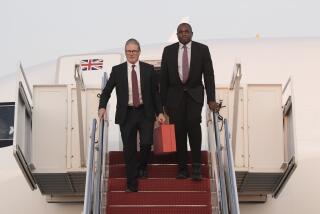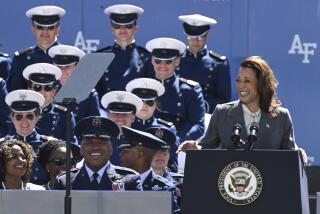Shultz to Visit Moscow to Press Arms Progress : Summit Is on Agenda; ‘Entirety’ of U.S.-Soviet Ties to Be Reviewed in Talks With Shevardnadze
- Share via
WASHINGTON — The White House, acting quickly after this week’s surprise progress in arms control negotiations, announced Friday that Secretary of State George P. Shultz will visit Moscow April 13-16 to review “the entirety of our relationship” with the Soviet Union, including the possibility of a summit meeting this year between President Reagan and Soviet leader Mikhail S. Gorbachev.
“The President is determined to maintain the momentum that has been generated” by the Soviet decision last weekend to seek a separate agreement on the elimination of intermediate-range nuclear forces in Europe, according to a White House statement read by National Security Adviser Frank C. Carlucci.
Rights, Other Issues
Besides arms control, he said, Shultz will discuss with Soviet Foreign Minister Eduard A. Shevardnadze regional problems such as the conflict in Afghanistan, human rights issues such as Jewish emigration and bilateral governmental matters such as an exchange of consulate offices.
“More important,” he added, the Administration hopes that the Moscow discussions will lead to “further steps . . . to move forward in all aspects of our relations, including the Geneva negotiations.”
Asked about a possible summit this summer, Carlucci said that such a meeting is “one of the things” to be discussed by Shultz and Shevardnadze. “If there’s progress--and I’ve just indicated that developments look promising--that (a summit meeting) would certainly be a possibility,” he added.
However, other White House and State Department officials indicated later that discussion of a summit is premature. “Things are extremely tentative about a summit,” one presidential aide said.
No Timetable Yet
“No one is talking about a specific timetable for a summit yet,” a U.S. official who deals with Soviet affairs said. On the other hand, this official added, “both leaders look now as if they have a real interest in a meeting, and this should increase pressure on their bureaucracies to get serious about moving toward agreements. So I could be cautiously optimistic that a summit will come off.”
Carlucci appeared before newsmen in the White House with the three U.S. negotiators at the arms talks, Ambassadors Max M. Kampelman, Maynard W. Glitman and Ronald F. Lehman. The men had come from Geneva to brief Reagan on progress there. Glitman, who heads the U.S. group in discussions that focus on intermediate-range nuclear forces, will return to Geneva for several more negotiating sessions based on the latest Soviet position.
In his offer to eliminate intermediate-range missiles in Europe, the Soviet leader proposed that each side be limited to 100 such warheads elsewhere. The Administration praised the Soviets for not linking an agreement on intermediate weapons to other, more difficult nuclear arms issues, most notably space-based missile defenses.
On Wednesday, U.S. arms negotiators in Geneva made a counteroffer to the Soviets. In this draft treaty, The Times reported, the Administration proposed that Moscow station all its 100 allowed warheads in a single base near Novosibirsk in Siberia, where they would not be able to reach most of Western Europe and Japan.
Talks Proceeding Well
Kampelman, responding to questions, said that negotiations on space-based defense issues have proceeded well. Although no dramatic advances comparable to the earlier intermediate-range weapons proposal were made, he indicated that the Soviets had offered at least one hint that they intend to be forthcoming in this negotiating category as well.
For example, Kampelman said he was “immensely” interested in a recent Gorbachev statement in which the Soviet leader did not repeat the usual Soviet objections involving anti-missile space defense work. In the past, Gorbachev has opposed any development, testing or deployment of the President’s space-based missile defense system, the Strategic Defense Initiative, popularly known as “Star Wars.” Last weekend, however, he called only for a ban on deployment.
If that indeed is the new Soviet position, it would permit a wider variety of SDI experiments. This, in turn, would lessen pressure for the United States to unilaterally adopt a broader interpretation of the 1972 anti-ballistic missile treaty that would allow for SDI testing--a redefinition that the Soviets have opposed--and reduce the risk that the United States would abrogate a treaty that has been a keystone in arms control for more than a decade.
On his trip to Moscow, Shultz is expected to ask whether the Soviets in fact have been signaling significant concessions on space defense, as well as on the intermediate-range missiles issue. His visit will be the first high-level U.S.-Soviet meeting since last November, when Shultz met with Shevardnadze in Vienna.
First Meeting in Geneva
Reagan and Gorbachev first met in Geneva in November, 1985. At that time, Gorbachev appeared to accept Reagan’s invitation to visit Washington in 1986, and Reagan was to go to Moscow in 1987. But relations soon soured. Gorbachev, shunning a Washington visit, abruptly proposed the meeting in Reykjavik last October. It failed dramatically to narrow differences.
After exploiting the propaganda fallout from Reykjavik for several months, Gorbachev last Saturday returned to his pre-Reykjavik position on medium-range missiles by offering to consider it separately from the other nuclear arms issues. This came only two days after the presidential commission headed by former Sen. John Tower (R-Tex.) criticized the White House over the Iran- contra scandal.
The sudden progress toward an agreement in the arms control area has provided a greater emphasis and significance to Shultz’s trip. In addition, two sets of lower-level meetings of U.S. and Soviet officials are scheduled for this month--on regional issues and on bilateral and human rights issues--that will probably clear away more underbrush before the Shultz-Shevardnadze talks next month.
Afghanistan Formula Seen
Under Secretary of State Michael H. Armacost will leave for Moscow next week to discuss the broad range of regional conflicts in which the two superpowers have interests. Most important is Afghanistan, from which the Soviets now appear willing to withdraw in 22 months--precisely the time the Administration has left in office--if an acceptable compromise on the nature of a new Kabul government can be worked out.
Other regional topics include Cambodia, which Vietnam continues to occupy; Angola and southern Africa, where Cuban troops are actively involved; and Nicaragua and other Central American issues.
Later this month, U.S. and Soviet officials will meet in Washington on bilateral and human rights issues, which include student and cultural exchanges, the long-delayed opening of a U.S. consulate in Kiev and a Soviet consulate in New York City, and disputes over construction of new embassies in both capitals.
More to Read
Sign up for Essential California
The most important California stories and recommendations in your inbox every morning.
You may occasionally receive promotional content from the Los Angeles Times.










